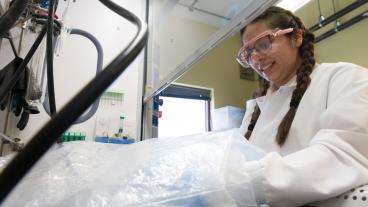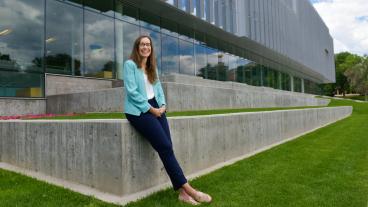Two Colorado School of Mines PhD students whose theses both take on the challenges of using alternative energy sources have been awarded the Dr. Bhakta Rath and Sushama Rath Research Award, given for dissertations that demonstrate the greatest potential for societal impact.
Vinh Nguyen, chemical engineering, and Michael Wagner, mechanical engineering, will be recognized at the Graduate Commencement Ceremony on May 11.
Nguyen’s thesis concerns the use of methane gas in fuel cells at low temperatures. “It’s very stable, so it’s hard to get energy out,” Nguyen said. Most processes that use methane require temperatures over 500 degrees—not desirable for use in a car, for example. Seeing cars run on fuel cells is what inspired Nguyen to enter the field, join the Colorado Fuel Cell Center at Mines and work with Chemical and Biological Engineering Professor Andrew Herring.
“It’s been extremely challenging to more than a generation of chemists and chemical engineers with very minimal success,” said Nguyen. “So when my advisor introduced this, I hesitated. But I was encouraged enough to work on it.”
In his first year, Nguyen was able to extract about 30 times more energy than previous systems, at temperatures between 80 and 160 degrees. Nguyen achieved this by developing a platinum catalyst that is distributed more evenly, using more of its surface area, and developing an ionic liquid that allows the methane gas and the water it needs to oxidize to diffuse at the proper concentrations.
“There’s a competition of transport between the water and the methane going into the fuel cell,” Nguyen said. “Methane is hydrophobic, and water tries to kick methane out, so we need an environment permeable for both at the same time.”
The energy produced is still low compared to hydrogen fuel cells, “but there is a very beginning of hope that methane or natural gas (which is 95 percent methane) is possible to use in a proton exchange membrane fuel cell, and it can be explored more in the future,” Nguyen said.
Large amounts of inexpensive methane are available in the US, so being able to use it more efficiently would be of great benefit. Also, the process emits no polluting gases—just CO2 and water.
“His PhD thesis will eventually result in six or seven high-impact papers that will lay the groundwork for the direct electrochemical utilization of methane,” said Colin Wolden, professor and interim department head of Chemical and Biological Engineering, who nominated Nguyen for the award.
Nguyen holds a bachelor’s degree in chemistry from the University of Colorado at Denver and a master’s in applied chemistry from Colorado School of Mines. He completed his PhD while working full-time as a principal scientist at TDA Research in Wheat Ridge, which he joined right after completing his BS.
“It’s been a challenge to do both work and school at the same time, plus two kids, and I’m glad it’s over,” Nguyen said.
Wagner’s dissertation presents a model for optimizing the dispatching of energy generated from concentrating solar power systems. CSP systems use an array of mirrors to focus the sun’s rays on molten salt, heating it up to over 1,000 degrees Fahrenheit. The heat stored in the salt can then be used to drive steam turbines and generate electricity.
“Usually, you just run it until it’s gone,” Wagner said. His thesis is part of an overall push to “move the tech from finding out whether you can do it to a market-competitive stage. How do you schedule it to maximize profit from a plant or minimize the cost of running the turbine all the time?” It’s akin to a car engine—sometimes it’s better to keep it running idle to avoid too much stopping and starting, while other situations call for turning it off to avoid wasting fuel.
Wagner wrote software that determines a dispatch strategy over 24 hours, considering factors such as system configuration, storage tank size, production capacities and ramp rates. He applied this model to a CSP plant in Tonopah, Nevada, called Crescent Dunes, one of just a few facilities in the world.
Because of the size of these facilities, they tend to be located in the desert Southwest, on reclaimed farmland or old Air Force bases. Crescent Dunes’ power tower, for example, stands 640 feet tall and is surrounded by 10,347 mirrors.
“The real challenge for CSP is to bring the costs down,” Wagner said. While storing the energy is relatively cheap compared to the batteries required for photovoltaic cells, the infrastructure is expensive.
Wagner’s methods are already being applied to CSP facilities under development. “Mike’s thesis is one of those rare examples where research made it to practice during the time of dissertation,” said Greg Jackson, professor and department head of Mechanical Engineering, who nominated Wagner. “And this in one of the grand engineering challenges for this century—to develop a robust and reliable electric grid based on renewable energy resources.”
Advising Wagner were Professor Alexandra Newman and Associate Professor Robert Braun, both in the Department of Mechanical Engineering.
Wagner’s thesis fits seamlessly into his work as a mechanical engineer in the Thermal Systems Group at the National Renewable Energy Laboratory. “NREL has been working on CSPs for a while, with research ongoing since the 1970s,” Wagner said. Other avenues of CSP research include overall system optimization and determining which salts to use for heat storage.
Wagner, who holds BS and MS degrees from the University of Wisconsin, Madison, joined NREL in 2009 and worked full-time as he pursued his PhD. In 2012, a month after learning he’d been accepted into the program, he and his wife learned she was pregnant. “It’s been a little bit overwhelming, but the end is near,” Wagner said.
Contact:
Mark Ramirez, Managing Editor, Communications and Marketing | 303-273-3088 | ramirez@mines.edu
Ashley Spurgeon, Assistant Editor, Mines Magazine | 303-273-3959 | aspurgeon@mines.edu



